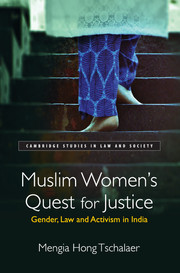Book contents
- Frontmatter
- Dedication
- Contents
- Preface
- Acknowledgements
- Abbreviations
- 1 From Legal Binaries to Configurations: Muslim Women's Rights Activism in South Asia
- 2 A Multidimensional Approach to Muslim Women's Activism: Mapping the Legal Landscape in the City of Lucknow
- 3 Destabilising Gendered Proprieties: Muslim Women's Visibility within the Public Space
- 4 Vying for a Gender Just Islamic Marriage Contract: Women's Legal Spaces
- 5 Legal Realities: Doing Gender Justice from Below
- 6 Muslim Women's Quest for Justice: Theoretical Implications and Policy Suggestions
- 7 Appendices: Model-Nikahnamas
- 8 Glossary
- 9 Bibliography
- 10 Index
5 - Legal Realities: Doing Gender Justice from Below
Published online by Cambridge University Press: 08 February 2018
- Frontmatter
- Dedication
- Contents
- Preface
- Acknowledgements
- Abbreviations
- 1 From Legal Binaries to Configurations: Muslim Women's Rights Activism in South Asia
- 2 A Multidimensional Approach to Muslim Women's Activism: Mapping the Legal Landscape in the City of Lucknow
- 3 Destabilising Gendered Proprieties: Muslim Women's Visibility within the Public Space
- 4 Vying for a Gender Just Islamic Marriage Contract: Women's Legal Spaces
- 5 Legal Realities: Doing Gender Justice from Below
- 6 Muslim Women's Quest for Justice: Theoretical Implications and Policy Suggestions
- 7 Appendices: Model-Nikahnamas
- 8 Glossary
- 9 Bibliography
- 10 Index
Summary
‘In the state courts, the truth of the cases remains hidden behind the lawyers’ interests. There, women are just puppets in the hands of men. You only get justice if they consider you ‘good’. Also in the Darul Qaza, the qazi is more interested to demonstrate his religious authority than in the lives of women’. This voice belongs to a young Muslim woman, whom I call Nisha. Nisha is a victim of domestic violence and a recent divorcee. For more than two years, she unsuccessfully sought to obtain maintenance for her daughter and herself in the Lucknow Family Court. Despite having spent all her saving money on court and lawyer fees, she has not ‘found justice’ or, ‘insaafnahi milld, as she says. As it emanates from Nisha's narrative, the state legal system's approach to women's rights is neither context nor value free. Instead, the formation of legal subjectivity, and thus women's access to ‘justice’, is more often than not shaped by the court's concern to uphold standards of'ideal feminine behaviour'- rather than egalitarian notions of citizenship. Similarly, the qazi of Lucknow's Darul Qaza is, according to Nisha's portrayal, not inclined to prioritise women's lives over often - orthodox interpretations of the religious scripts.
Finding herself in great financial despair and with no support from her natal family or community members, such as the religious authorities who run two darul qazas in the city or the Maulana from the local mosque, Nisha sought help and support with Bazme Khawateen. Shehnaz Sidrat has opened the doors of her office about a decade ago to Muslim women litigants who wish to solve their family disputes apart from the men-dominated state and Shariat-courts. The All India Muslim Women's Personal Law Board (AIMWPLB) also offers legal counselling and support for those who wish to solve their disputes in a cheap and efficient manner. As Shaista Amber told me, there was an urgent need for a women-friendly legal forum in the city of Lucknow, where women's problems and concerns were taken seriously.
- Type
- Chapter
- Information
- Muslim Women's Quest for JusticeGender, Law and Activism in India, pp. 142 - 179Publisher: Cambridge University PressPrint publication year: 2017



